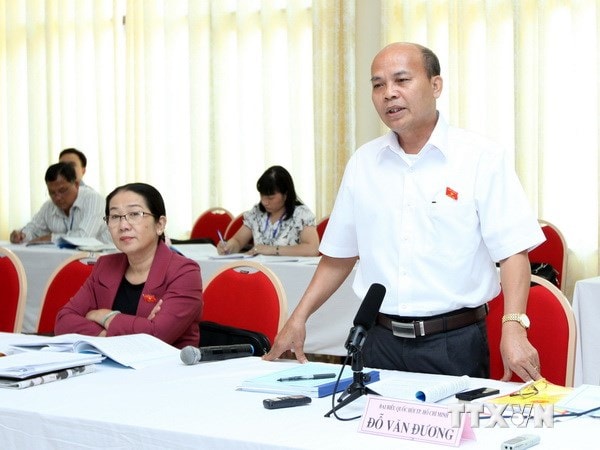The People's Procuracy Bill has concretized the 2013 Constitution.
Continuing the program of the 7th Session of the 13th National Assembly, on the afternoon of May 22, National Assembly deputies worked in groups, discussing the draft Law on the Organization of the People's Procuracy (amended) and the Law on the Organization of the People's Court (amended).
 |
| Ho Chi Minh City National Assembly delegate Do Van Duong speaks at the meeting. Photo: VNA |
Through discussion, many opinions assessed that the two draft laws have many new provisions, initially concretizing the provisions of the 2013 Constitution, demonstrating a number of the Party's judicial reform orientations related to the organization and operation of the People's Court and the People's Procuracy.
Discussing the Law on the Organization of the People's Procuracy (amended), many opinions agreed with the necessity of amending the current Law because the 2013 Constitution has new and important contents on the institution of the People's Procuracy; the draft Law needs to stipulate and clarify new and progressive principles of judicial proceedings directly related to the activities of the People's Procuracy.
Opinions say that amending the Law on Organization of the People's Procuracy according to the requirements of judicial reform aims to create a legal basis for comprehensive innovation in the organizational system, functions, tasks, operating principles, standardizing judicial positions and ensuring the leadership of the Party...
Delegate Dinh Xuan Thao (Hanoi) basically agreed with the scope of the draft Law, which is to fundamentally and comprehensively amend according to the judicial reform policy stated in the Party's resolutions and documents on judicial reform, especially Resolution No. 49 of the Politburo on "Judicial Reform Strategy to 2020" and specify the provisions of the 2013 Constitution.
Agreeing with this view, delegate Nguyen Dinh Quyen (Hanoi) further emphasized that the amendment aims to ensure the independence of competent agencies in judicial activities in compliance with the law.
This content is expressed in terms of models, organizational structure, staff, civil servants, public employees, judicial titles and working relationships between institutions of the prosecutor's office, court and investigation agency.
Some opinions agree with the draft Law on the necessity to clearly stipulate the content and scope of functions of exercising the right to prosecute and supervise judicial activities; on the tasks, authority, rights to request, recommend, and protest of the People's Procuracy in performing its functions and tasks (Articles 2, 3, 4, and 5), and the responsibility of coordination between the Investigation Agency, the Court, and the Enforcement Agency for the activities of the People's Procuracy.
This provision creates a legal basis for specifying the tasks and powers of the People's Procuracy in procedural laws. Many opinions also basically agree with the draft Law on the organization of four levels of People's Procuracy according to the requirements of judicial reform (including the Supreme People's Procuracy, the High People's Procuracy, the Provincial People's Procuracy, the District/Regional People's Procuracy); the organization, tasks and powers of each level of People's Procuracy and Military Procuracy.
Delegate Dinh Xuan Thao agreed with the regulation that the Supreme People's Procuracy should continue to maintain the current multi-component selection council mechanism for Supreme People's Procuracy Prosecutors.
Delegates analyzed this regulation to comprehensively evaluate ethical qualities and professional reputation without the need to apply the form of examination, because the Supreme People's Procuracy's Prosecutors are leading officials who have been examined and trained through many Prosecutor ranks.
For other Procurator positions, it is necessary to combine the form of Selection Council and examination to both assess the sense of responsibility and moral qualities, and select Procurators with qualifications and capacity, in line with the current trend of selecting civil servants in the direction of judicial reform; at the same time, ensuring prudence, objectivity, fairness and supervision by agencies and organizations over the personnel work of the Procuratorate.
Discussing the Law on the Organization of People's Courts (amended), many opinions agreed with the guiding viewpoint in drafting the Law project. Opinions said that the amendment must fully institutionalize the Party's policies on judicial reform, concretize the provisions of the 2013 Constitution stipulating that "People's Courts are the judicial bodies of the Socialist Republic of Vietnam, exercising judicial power," clarify the system, structure, and organization of the People's Courts of the country and the structure, organization of the apparatus in each People's Court as well as the management mechanism of the People's Court in terms of organization to ensure the independence of trial activities, meeting the requirements of judicial reform.
Some opinions agree with the establishment of a regional People's Court of First Instance as Option 1 (Article 32) of the draft Law, contributing to overcoming the limitations and shortcomings in the organization of the current district-level People's Court, enhancing the independence of the regional People's Court of First Instance in adjudication, focusing on investment in facilities and staff, avoiding dispersion, averageness, and waste...
There is agreement with the regulation that the title of Judge will be divided into four lines, including Supreme People's Court Judge, Senior Judge, Intermediate Judge, and Primary Judge.
This regulation is consistent with the provisions of current laws on cadres, civil servants and civil servant ranks. At the same time, it ensures clear differentiation of the team of judges in terms of standards, moral qualities, professional qualifications, professional capacity and work experience.
The higher the rank of a judge, the higher the standards must be; in accordance with the selection mechanism when first appointed or promoted to the rank of judge and the organization of the four-level People's Court.
According to Vietnam+






